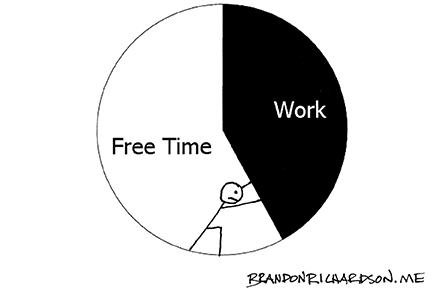Whether or not we work isn’t a choice most of us get to make. But, what we work on is.
How We Spend Our Time
According to the most trustworthy source I can find — the internet — the average life expectancy of Americans is 78.7 years. This is based on census data from 2015, so that will probably increase over the next few decades. Let’s say our current life expectancy is 82.
Of the 82 years we will spend on this planet, 18 of them are spent in bondage — or “youth.” We can’t wait to be legal adults so we can do whatever we want, whenever we want. So, if we throw out these 18 wasted years of life, we’re left with 64 years of freedom. Assuming we enjoy four years in college and “retire” at 67, this means we spend 45 years as a working adult.
There are 394,200 hours in 45 years. On average, we will spend 131,400 of those hours sleeping. After the 110,250 hours we spend working, this leaves 152,550 hours of “free” time.
I’ll spare you the rest of the math (you can trust this random internet blogger). Of all the hours we’re awake, we spend 42% of them at our jobs. Here’s how this looks on a scary pie chart:

At this point, I wish I could say, “We should definitely freak out and reconsider what we’re doing with our lives.” But, there’s more to the story.
The Ancient Meaning of “Work”
For more than 99% of the time humans have been in existence, “work” as we know it wasn’t a thing. People didn’t wake up every day and go to their “jobs.” Instead, their “work” was just trying to not die.
Ancient civilizations hunted for food, which was probably a little more difficult with a spear than a rifle. They gathered fruits or nuts from whatever plants were around, hoping none of them were poisonous. When they learned to grow their own crops, they spent their time cultivating them. Of course, they had no way to prevent Mother Nature from destroying those crops on a whim.
For thousands or millions of years, people did everything for themselves. They built their own shelter. They made their own clothes, tools, and weapons. Unless they were slaves — then they did all of this stuff for someone else.
We don’t have any results from Survey Monkey or the Gallup Poll, but it seems safe to guess that ancient civilizations spent a lot of their time working — maybe even 42% or more? That’s if they were lucky enough to survive childbirth.
Trading Time for Money
All of this changed with the Industrial Revolution. Mankind created machines and processes that completely changed the way things are made. They created jobs for people to run these machines and processes, where workers were given money in exchange for their time. And that money was then exchanged for food, shelter, and clothing made by someone else.
Basically, we just changed the way we work. Now that necessities could be mass-produced, people could “work” on those crazy ideas they had: light bulbs, telephones, airplanes, medicine, automobiles, computers, and peanut butter M&Ms. All of this progress led to lower infant mortality rates, decreased famine, increased connection, and new types of stress.
Stress is Relative
Instead of worrying about starving to death when a freeze wipes out our crops, now we worry about paying our mortgage. The biggest difference in this post-Industrial Revolution age is that losing our house doesn’t mean we’re going to die. The stakes are lower now, but stress is stress.
Ancient civilizations had no concept of treated water or electricity, so they probably didn’t worry about those things. They worried about finding food and shelter. Today, we worry about making enough money to pay for food and shelter.
The way we obtain the necessities in life has changed, and with it, so have the things we stress about.
Choosing Our Work
Humans have always had to work, so avoiding work altogether is probably a few more years away. But, there’s one major difference between today and yester-century: We get to choose the work we do.
This is liberating. If we don’t like our job, we can look for a new one. We can take online courses or go back to school. We can start our own business or be a freelance “company of one.” We can use some of those 152,550 hours of free time to think, build, create, or try new things. Our options are absolutely endless, so why don’t we take advantage of this freedom?
Because we’re scared — I know I was (and am). Scared of failure, criticism, or imperfection. Scared we won’t be able to pay the bills. We’re scared to just stop thinking and do the work we want to do.
I recently watched the Netflix documentary, Jim & Andy, which details a turning point in Jim Carrey’s life when he played the role of Andy Kaufman. In one scene, Jim talks about how his father was a great jazz musician, but he gave that up to become an accountant so he could afford to raise his family. He sacrificed his dream. Then, after many years with an accounting firm, his dad lost his job. This is when Jim realized:
“You can fail at what you don’t love, so you might as well do what you love.” — Jim Carrey
Since the dawn of mankind, humans didn’t have much choice regarding the work they did. Now, the choices are limitless.
We get to decide how we spend our 42%.
